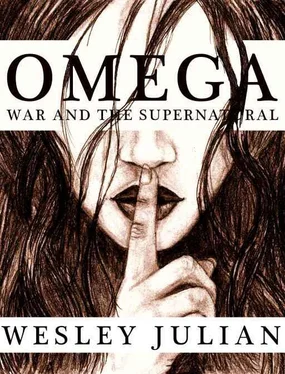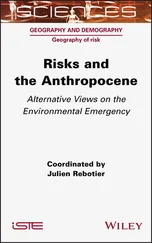OMEGA
War and the Supernatural
An Anthology by Wesley Julian
For my grandfathers:
Donald Julian served the United States Marine Corps
W. Wayne Allen served the United States Army
The Ghost of Passchendaele
Darkness passes
All darkness passes, does it not?
Is there not light
that ends all night?
May this darkness fade
Pray this darkness fades.
Nearly a century ago, harrowed night filled this field. Luminescence burst from the guessing blasts of four million terrorizing shells. Death rained from the sky; death blasted from the furious guns. Piercing eyes gazed from the trenches, longing for hope, but meeting only calamity. Both sides prayed: May God relieve this scathing horror. Desire found them not, for to do this was sin; unforgivable, bloody sin. This night brought the cursed, sleepless nightmare. To wake is to die, for on the morrow, they would either harbinge death or they would meet her.
Death move onward.
Death I am not ready.
Death move onward.
The field is plain now. The ignorant might set foot here and never know the fates decided. A lone man stands on the field, searching for something- — not an object, but a place. He compares aging landmarks until finally he knows. With outstretched arms, he closes his eyes and knows precisely where he stands. His face bears gain, but not triumph; this is not a place he wishes to be. Not again. He looks back at you, the pain in his eyes transparent. This is a tale that must be told, for we cannot forget.
He begins, “This is it. This is where my foxhole was. I remember it was here because of that tree over there. It’s so much bigger now. You didn’t see many trees. Most of them got hit by artillery or were shot, but this one got through alright. I mean, it got shot and all, but it stood. And it’s green now. Everything was so brown then, so colourless. Nothing grew at all. War isn’t a time for sowing; it’s a time for reaping. It’s not a time for life; it’s a time for death. It’s a time to kill.”
Swallowing, he continues, “It was on October the 12th, 1917 when our commanders finally blew the whistle. The war dragged onward slowly. Neither side made progress because trench warfare is built on waiting. You build and dig as deep as you can because sometime or another the other side has to try to come and kill you. But there you are with your riflemen, and your snipers, and your barbed wire, and your landmines, and your machine guns, and you — and your—” he draws a flask containing whiskey and drinks from it. “There’s so much. It’s hard to keep it all in perspective. Back then, though, we had to know it all because any which part of it could kill you whenever it pleased. Death mocked us by all her means.”
The soldier puts his whiskey away and with a trembling hand, wipes his mouth. “You know, there’s a time when you sit down and forget what you are. You know you’re scared and you know you want out of there, but then comes the part when you stop asking why. You stop looking for purpose in the nightmare and soon, even you refer to yourself as ‘private.’ Sometimes the officers threw in our last names, but that was only if they knew it. When I figured this out, I remember pretty clearly that I had this notebook; very small, I don’t remember exactly why I brought it. Maybe to draw. But I started writing my name and I did it every day. I wrote down my name with all that I could remember:
Private Thomas Shane Holdsworth, 7th Duke of Cornwall’s Light Infantry, from the Upper East Side of London. Father is William Thomas Holdsworth and mother is Bridgett Shane Holdsworth. His sister is Lillian Holdsworth. Private Thomas Shane Holdsworth: dead man.
“Sometimes I’d put down more than that, like the name of my dog or my address. I held onto something though. Everybody had something. Some guys had some stupid good luck charm or a picture of their girlfriend. I just had my goddamned notebook.” He shrugs and reaches into his jacket for a cigarette. He lights it and takes a few uneasy puffs.
His smoke break and his tangent end. “Our trench is over there. I thought they were crazy when they told us to go over in the rain and mud. But we did. And they were. Nobody in my company was going to disobey orders. We were good men, all of us. But pushing on was slow and hard work. There was so much mud, so much fucking mud. The shell holes were the worst though. Because of all the rain, they were more like pools; brown, slimy pools. If you wanted to be in cover, which you would unless you were barking mad or had a death wish, you would have to be waist deep in murky water to be fully covered. That deep and you’ve got to make sure your pack and your matches stay dry. A lot of gear was wasted because it got wet.
“The Jerries blasted bullets at us as we advanced on them. The further we got, the more scattered we were, and the easier it was to pick us off one by one. One by fucking one.” He pauses and thinks it over. “I remember it was Turner who I saw shot first. It’s unforgettable seeing a friend die. Suddenly he’s there and then he isn’t. I mean, he’s there, but he’s empty. He’s dead. Shit, I don’t know. You don’t know either. You don’t unless you were there and even then you still don’t really know.” Tom stops and smokes some more. It calms him.
“You can’t be in this and not know you’re going to die. You also have to know that your friends are going to die too. Think yourself dead and there isn’t anything left for Jerry to kill. But there isn’t any amount of mental preparation that can get you ready for this. I suppose it helps making yourself somewhat prepared; as much as possible, I suppose. Even just the noise would have scared me off if I wasn’t at least a little ready. A gun is a loud thing. At basic training, it scared the hell out of me when I fired my Lee-Enfield for the first time. It scared me so bad that I dropped it. The sergeant had it in for me after that!” Tom laughs. “But the battlefield is different. There’s our rifles and there’s their rifles. And then there are the grenades and the artillery and the machine guns — oh, God, the machine guns. One of my greatest fears was to be on the front end of a machine gun.” He stops and sips more of his whiskey.
“We charged and I got to my foxhole already sopping wet and dirty. There was another man with me, Private Wolsey. I didn’t know Wolsey very well, but he got mud in his receiver and his rifle gave him fits of trouble I had to help him with. I remember how he died. He stood up to take a shot, but his gun misfired. When he tried to fix it, I suppose he forgot to get back down in cover or something. His blood fell onto my face like the rain, but I could hardly tell the difference. And then he fell straight back into the water. Lost. I never saw his face again. He was totally under. It kills me now that I think about it too because what if he was still alive and the poor bastard drowned in there?”
He closes his eyes, sits under the shade of the tree, and starts on a second cigarette. “I killed three men that day. I don’t remember their faces; they were just men with helmets. I wish I did though. Some part of me wants to believe that I killed human beings. It’s sad to me that I have to convince myself of that because that other part of me wants me to think that I was killing those animals on those bloody posters. The Huns. They aren’t mindless Huns though. I think it’s just the part of me, or maybe, I don’t know. I suppose it’s just some kind of stupid honour. Don’t tell me it’s better to think of my enemy as Huns; I know that. I should absolutely want to kill them and never let myself over think it. I can’t just erase them though. Some poor Jerry bastard has a stupid notebook like I do where he writes his name. This Jerry has a family and a sister and they’re all going to cry when they hear he’s fucking dead.
Читать дальше












